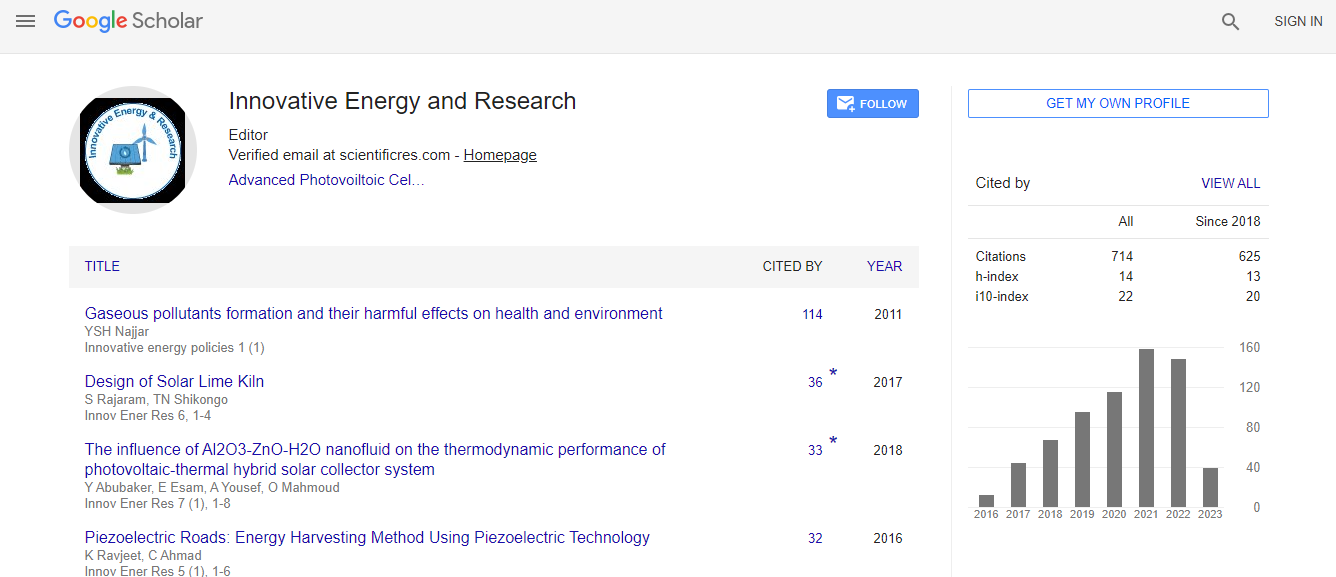Our Group organises 3000+ Global Conferenceseries Events every year across USA, Europe & Asia with support from 1000 more scientific Societies and Publishes 700+ Open Access Journals which contains over 50000 eminent personalities, reputed scientists as editorial board members.
Open Access Journals gaining more Readers and Citations
700 Journals and 15,000,000 Readers Each Journal is getting 25,000+ Readers
Google Scholar citation report
Citations : 712
Innovative Energy & Research received 712 citations as per Google Scholar report
Innovative Energy & Research peer review process verified at publons
Indexed In
- Google Scholar
- Open J Gate
- Genamics JournalSeek
- RefSeek
- Hamdard University
- EBSCO A-Z
- Publons
- Euro Pub
- ICMJE
Useful Links
Recommended Journals
Related Subjects
Share This Page
Gaint Seebeck coefficient in the microwave synthesized Co (OH) 2 nanoplatelets for thermoelectric power generators
Joint Event on 2nd International Conference on Renewable Energy and Resources & Energy Materials and Fuel Cell Research
Ahmed Alshahrie, Numan Salah, Asim Jilani, Adnan Memic,Abdullah Alshiki and Kunihito Koumoto
King Abdulaziz University, Saudi ArabiaToyota Physical and Chemical Research Institute Nagakute, Japan
Posters & Accepted Abstracts: Innov Ener Res
Abstract
Renewable energy is quite important for the future energy demands. It also can overcome the global warming and CO2 emissions created by fossil fuels combustion. Sunlight heat and other sources of heat are considered as a good sources for renewable energy. Thermoelectric materials (TE) are promising as energy generators, by means converting heat into electrical energy. In this work cobalt hydroxide (β-Co(OH)2) nanoplatelets were synthesized by the microwave chemical assisted route and studied for their thermoelectric properties. Uniform nanoplatelets were produced with a thickness and diameter around 8 and 100 nm, respectively. The TE measurements revealed a giant positive value for Seebeck coefficient, which is around 50,000 μV/K. This positive value indicating a p-type semiconductor. It was observed to slightly increase by increasing the temperature from room temperature to 400 K. The electrical conductivity of this nanostructure has a semiconductor behavior with a moderate value, which has been observed to increase from 0.4 to around 3 S/m by increasing the temperature in the above-mentioned range. The power factor value was calculated and found to strongly depend on the temperature. It drastically increased from 500 to 9000 μW/m.K2 by increasing the temperature from room temperature to 400 K. These preliminary results are quit promising for future TE materials and might be suitable for thermoelectric power generators.Biography
Ahmed Salem Alshahrie is the director of the Nanotechnology center and head of the Physics department at King Abdulaziz University. He has BSc, in Physics in 2001, King Abdulaziz University; MPhil in Physics, 2007 University of Wales Swansea, Swansea UK. PhD, in Physics, Swansea University, Swansea UK. Teaching different courses in the Physics Department. He spent a good time at a well recognized research center. His research work is mainly focused on Photonic Nanomaterials, Raman Spectroscopy, nanostructure, Synthesis, Characterization applications. He has a good number of articles published in revered international journals.
E-mail: aalshahri@kau.edu.sa

 Spanish
Spanish  Chinese
Chinese  Russian
Russian  German
German  French
French  Japanese
Japanese  Portuguese
Portuguese  Hindi
Hindi 
